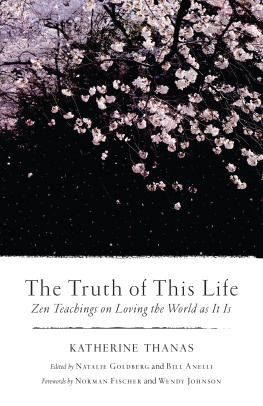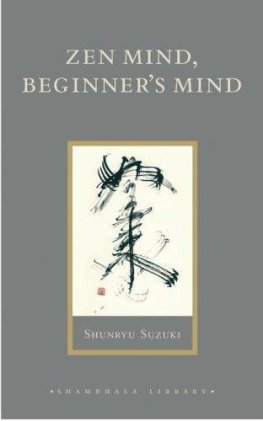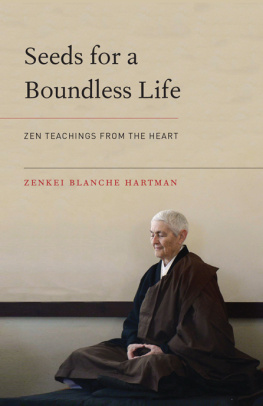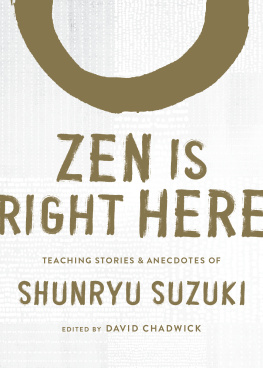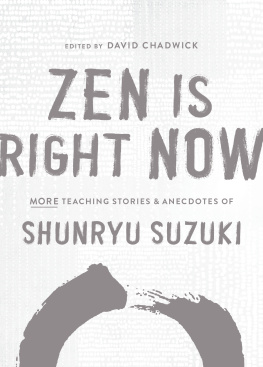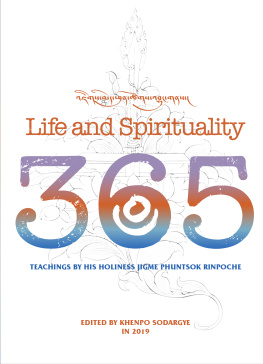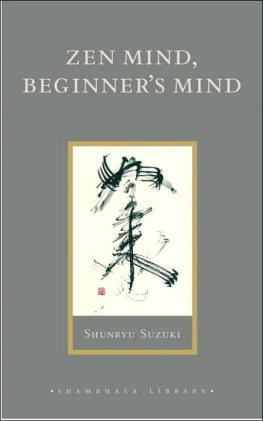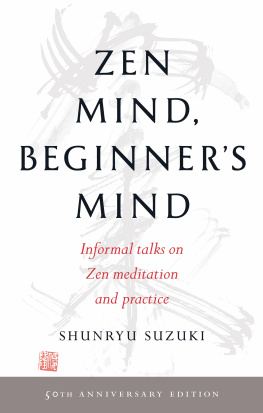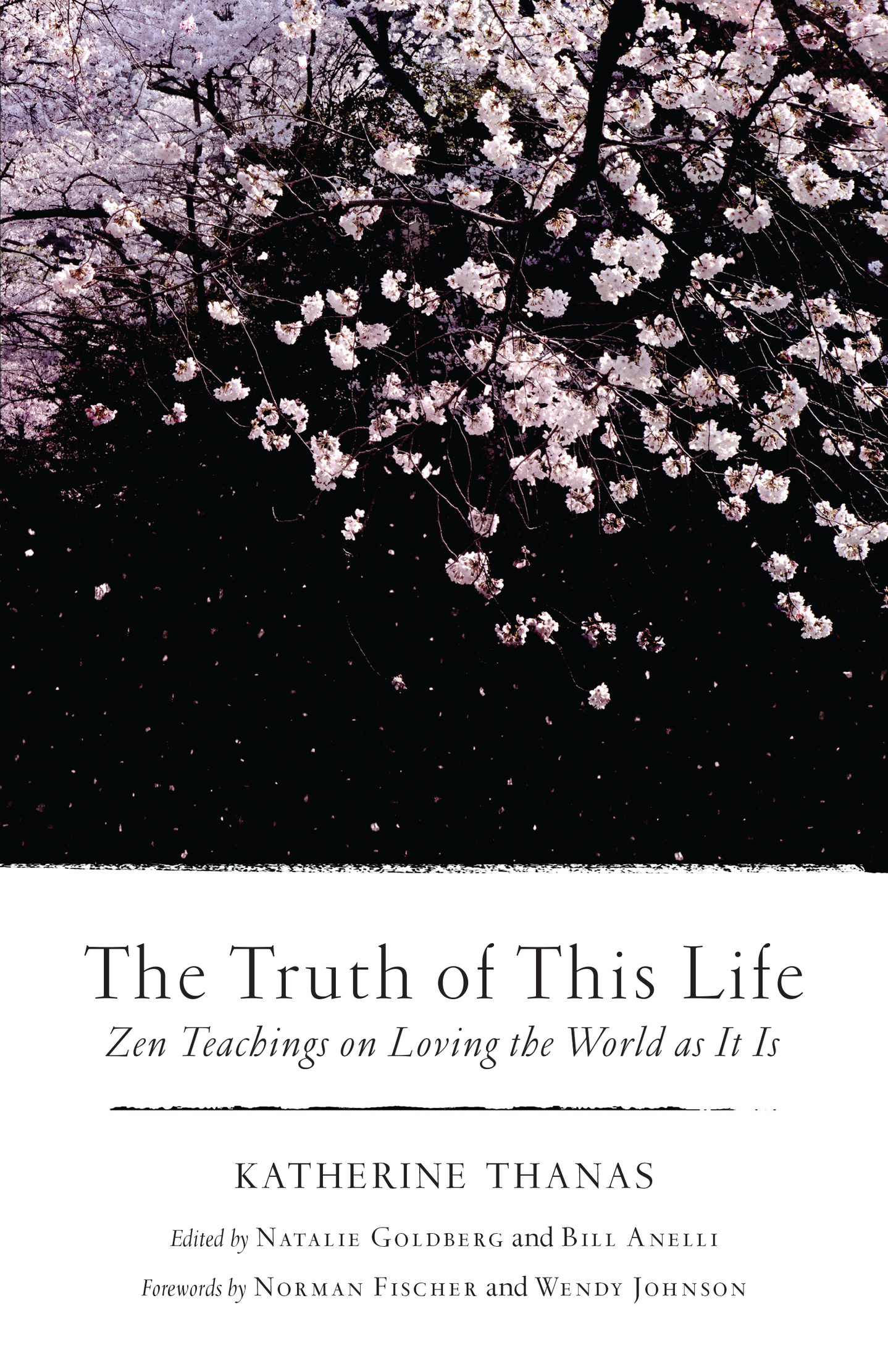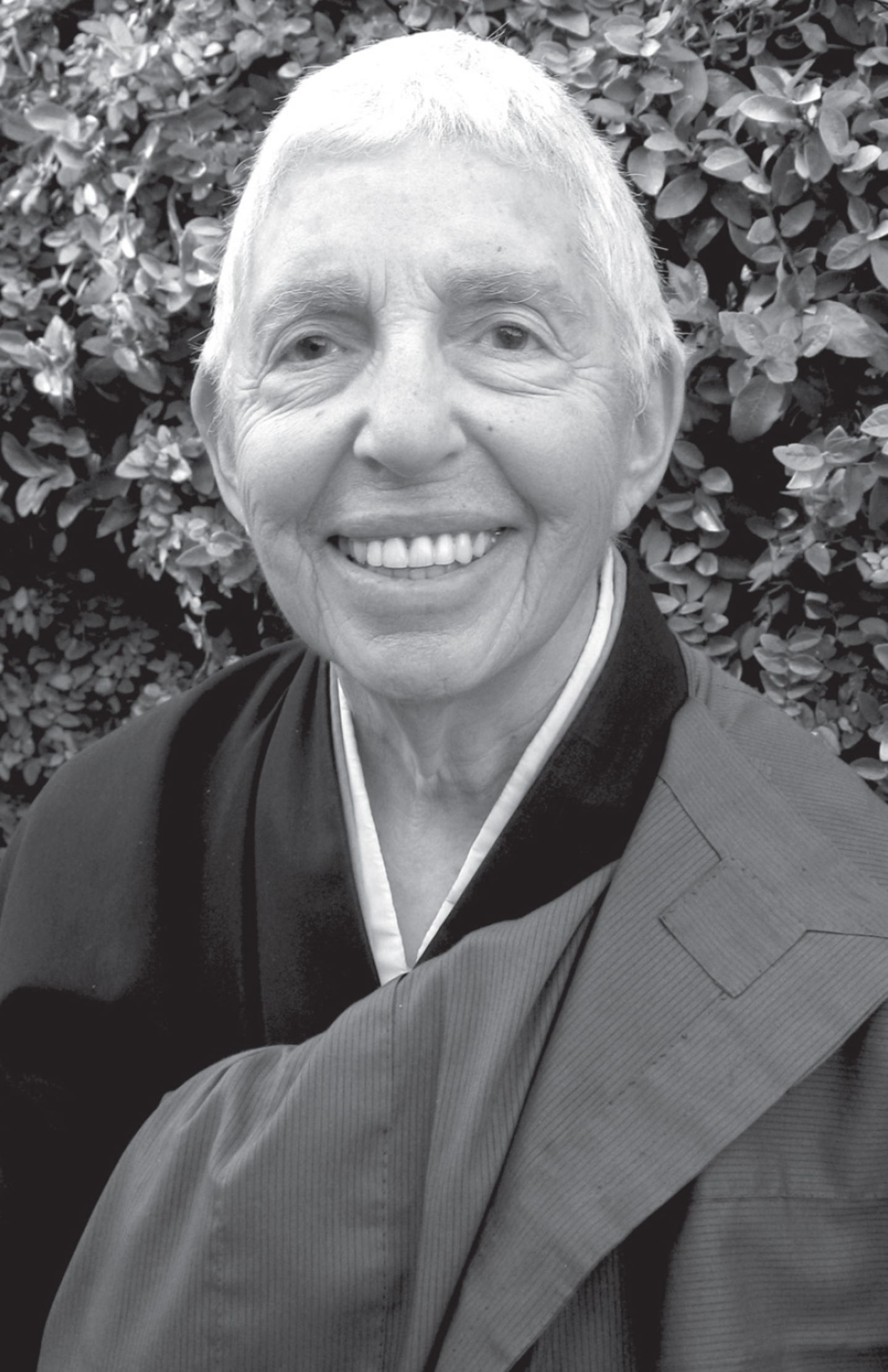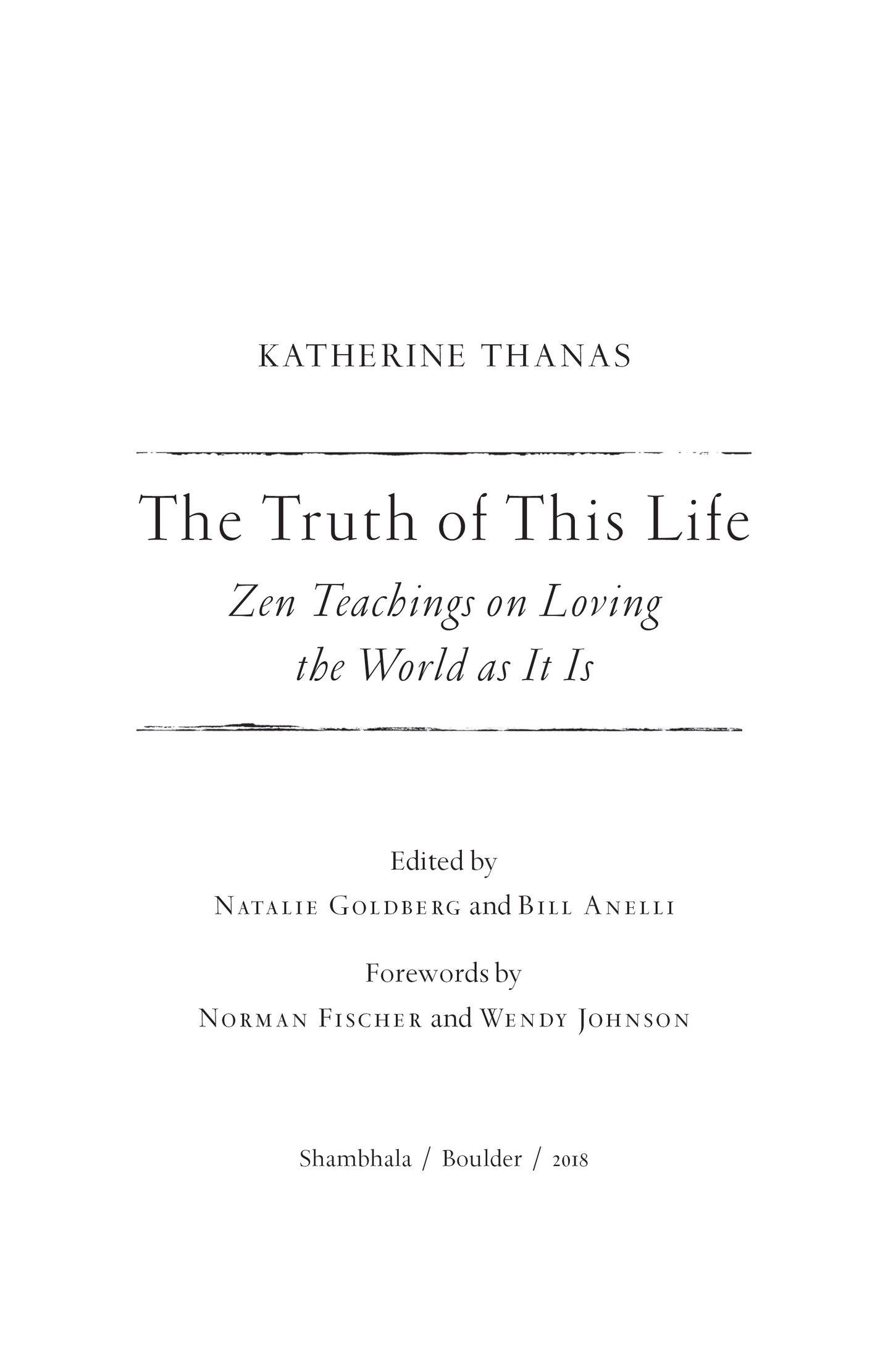Sobun Katherine Thanas
Shambhala Publications, Inc.
4720 Walnut Street
Boulder, Colorado 80301
www.shambhala.com
2018 by Santa Cruz Zen Center
Frontispiece by Kokyo Henkel.
Valentine for Ernest Mann from Red Suitcase by Naomi Shihab Nye. Copyright 1994 by Naomi Shihab Nye. Reprinted with the permission of The Permissions Company, Inc., on behalf of BOA Editions, Ltd., www.boaeditions.org.
Excerpt from A Ritual to Read to Each Other from Ask Me: 100 Essential Poems by William Stafford. Copyright 1960, 2014 by William Stafford and the Estate of William Stafford. Reprinted with permission of The Permissions Company, Inc., on behalf of Graywolf Press, Minneapolis, Minnesota, www.graywolfpress.org.
All rights reserved. No part of this book may be reproduced in any form or by any means, electronic or mechanical, including photocopying, recording, or by any information storage and retrieval system, without permission in writing from the publisher.
Designed by Daniel Urban-Brown
Cover design: Daniel Urban-Brown & Kate White
Cover art: Amana Images Inc. / Getty Images
L IBRARY OF C ONGRESS C ATALOGING-IN- P UBLICATION D ATA
Names: Thanas, Katherine, author. Title: The truth of this life: Zen teachings on loving the world as it is / Katherine Thanas; edited by Natalie Goldberg and Bill Anelli; forewords by Norman Fischer and Wendy Johnson.
Description: First Edition. | Boulder: Shambhala, 2018. Identifiers: LCCN 2017018890 ISBN 9781611804683 (pbk.: alk. paper) Subjects: LCSH: Religious lifeZen Buddhism. | LoveReligious aspectsZen Buddhism. | LifeReligious aspectsZen Buddhism. | Buddhist philosophy. | Zen BuddhismUnited States. Classification: LCC BQ 9286 .T 43 2018 | DCC 294.3 / 444dc23 LC record available at https://lccn.loc.gov/2017018890
eISBN9780834841208
v5.1_r2
a
This book is dedicated to Katherines beloved nephews, Steve Lansky and David Lansky.
Contents
Foreword
Norman Fischer
K ATHERINE THANAS stands firm and tall amid this generation of early American Zen pioneers. Like so many in the early days, Katherine came to Zen practice through reading, cultural experimentation, and art.
Thanas is a Greek name. The dutiful daughter of a patriarchal Greek father, Katherine, a woman of her time, grew up deferring to men. So it was no stretch for her to become a loyal disciple of a male Japanese teacher, the great Shunryu Suzuki Roshi,* and later of his male successor, Reb Anderson. She thoughtfully and painstakingly followed their lead. She was a good Zen student and a perfectionist.
I say this not so much to characterize Katherine, but to indicate the way so many of us, men as well as women, approached the practice then: deferentially, idealistically, dutifully, and with a strong dose of self-punishment. If anything, Katherine had these qualities in greater supply than most.
Which makes her liberation and full development as a wise and mature Zen teacher the more remarkable. Katherine found freedom and depth of understanding not through hard practice (though she did do hard practice) or her breakthrough brilliance but through staying with the situation (a phrase you will find a few times in these talks). By this she meant never giving in or up, instead simply remaining fiercely and intimately present with what is going on, no matter what.
Stay with the situation. Katherine often spoke this phrase when my wife Kathie and I practiced closely with her as fellow monks at Tassajara Zen Mountain Center* in the late 1970s. This is Katherines plain and solid teaching.
Katherine remained very much Katherine. Like any strong Zen teacher she was pungently merely herself. She says: I spent many years trying to be someone other than Katherine. But the more I practiced, the more I became Katherine.
But the paradox is, as she says, When were most completely ourselves, were most completely free of ourselves.
And this is why in Bill Anellis moving introduction to this book, his second visit with Katherine revealed much more to be found in this profound teacher. A teacher honed by decades of Zen practice that brought forth spaciousness, humor, joy, and a deep seriousness. He was soon, as he writes, hooked.
I leave the last word of this foreword to my dear Zen colleague, whose laughter and bright steady presence I will miss until the end of my time: Our life can be measured in moments of backing off or going straight aheadbacking off of conflict, of difficulty, frustration, fearor willingness to trust and go with the momentnot because its comfortable but because its here.
Foreword
Wendy Johnson
I FIRST MET Katherine Thanas in the early 1970s at Tassajara Zen Mountain Center, deep in the folds of the Ventana Wilderness of the central California coast. I was twenty-five years old. Katherine was a generation ahead of me, having begun her Zen practice in 1967 with Shunryu Suzuki Roshi, whod arrived from Japan to lead the congregation at the Sokoji temple in San Francisco. She met Suzuki Roshi, entered the path, and never turned back.
In the winter of 1974 at Tassajara, I was Katherines roommate. We shared cabin 15, a drafty redwood shack that clung by its claws to the cliffs above Tassajara Creek. Our cabin had two tiny bedrooms. Katherine lived in the back room, closest to the creek, with a small toilet and sink that we shared hidden behind a rough muslin curtain. Every morning before zazen, I rapped on her door to warn her before crossing the stone-cold floor of her room to use the bathroom. If Katherine was in her room, I bowed to her. Otherwise, we never said a word in our cabin during that ninety-day practice period. More often than not, Katherine was gone in the morning, having left early for four a.m. meditation.
Suzuki Roshi had died almost two years before our Tassajara practice period. His death was a raw gash across the young body of American Zen. Animated by grief and unwavering intensity, our training period of more than seventy students practiced constantly, as if to save our heads from fire. We needed the classic Zen admonition that Suzuki Roshi had scrawled not long before his death across the face of the wooden sounding block that called us to mediation six times a day at Tassajara:
Wake up!
Life is transient
Swiftly passing
Be aware
The Great Matter
Dont waste time
In early Zen there were very few strong female role models or recognized teachers. From the first, Katherine was a guide for me. Egalitarian, piercingly intelligent, and beautiful in both a severe and a sensual way. I remember the slight lift of her eyebrows whenever logic strayed into the shoals of opinion. Open the eye within the eye, was one of Katherines favorite encouragements from Suzuki Roshi.

